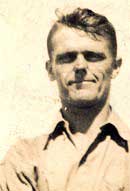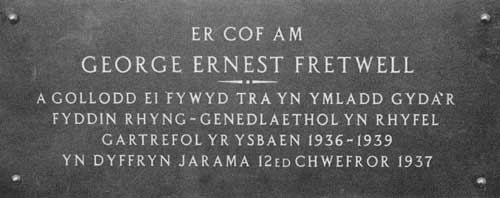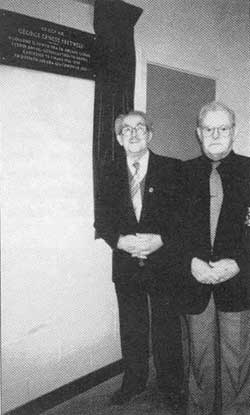George Fretwell
It
was pay-day, Friday, outside a slate quarry at
the Welsh-speaking village of Penygroes, North Wales,
during the early days of the Spanish anti-fascist
war. A man was auctioning a militia man's hat and
a militia woman's scarf to raise money for ambulances
for Spain.
The
slate workers threw in the small change left in their
opened pay- packets, but later the auctioneer to
his surprise discovered two unopened packets which
both moved and worried him because the workers' pay
was so pitifully small. It was all the more remarkable
because the area was noted for its Lloyd George liberal
rather than socialist traditions.
The
auctioneer was anti-fascist Douglas Hyde who had
made several trips to raise money for the ambulance
fund in villages and towns in mid- and north Wales.
When he arrived in Penygroes he had been advised
to go to the quarry to publicise a fund-raising meeting
and the showing of Ivor Montagu's documentary film
Defence of Madrid in the village hall that evening.
 Image: George Fretwell. Image: George Fretwell.
That
visit resulted in one young unemployed man from the
village, George Fretwell, leaving for Spain - he
did not tell his family where he was going, just
asked his brother to look after his bicycle and disappeared:
he wrote home from Paris and later from Plaza del
Fargo, Spain. Nothing more was heard from him.
George
was an ardent member of the Territorials with the
rank of sergeant. He was one of three sons and a
daughter. His father had had both his legs amputated
in the First World War and his mother had a hard
time bringing up the children on a small army pension.
Two
months later on 12 February 1937 George was killed,
aged twenty-six, in the bloody battle for Arganda
Bridge, in the Jarama Valley - a crucial engagement
to prevent the Franco forces cutting the road between
Madrid and Valencia. He went into battle at 7 a.m.
with over 600 members of the British Battalion; 12
hours later, fewer than 150 answered the roll-call.
He was buried the next day with thirty other International
Brigade volunteers in an olive grove.
Bill
Rust, in his book 'Britons in Spain', explained how
the badly armed volunteers, most of them facing their
baptism of fire 'steadily held their positions for
hour after hour, under a broiling sun while death
rained down on them. To retreat, to run away would
have been easy. But these men had left their homes
to fight Fascism, and the order of the day was "hold
out at all costs". They held out and kept the
enemy back.
During
these February days, the 12th, 13th and 14th, the
Republican forces in the Arganda-Morata sector resisted
the heaviest attacks of the entire battle of Jarama,
and succeeded in bringing the fascist advance to
a halt.' Madrid was consequently saved from fascism
for another two years.

Image: George Fretwell's commemorative
plaque.
It
was only in the following year, 1938, that his
family was told George was 'missing, believed killed'.
But
not until 1970 did they know precisely how and
where he was killed, through fellow Welsh veteran International
Brigader Glyn Evans, who had been with George
in
Spain. The following year as a result of a newspaper
article about George, another veteran, George Magee
of Cheshire, visited the family and told them he
had been in the burial party.
 When
in 1938 the news of his death reached Penygroes,
the small village community was divided - some saw
him as a hero and were proud that he had gone from
their little community and died for Spain, but others,
shocked by his death, were resentful that a young
life had been thrown away. When
in 1938 the news of his death reached Penygroes,
the small village community was divided - some saw
him as a hero and were proud that he had gone from
their little community and died for Spain, but others,
shocked by his death, were resentful that a young
life had been thrown away.
Much
time has passed to heal the wound and what in particular
united the small community was the decision to launch
an appeal fund for a memorial in Penygroes for George
Fretwell - the idea came from people who had grown
up with George and was discussed over a number of
years by the Memorial Hall Committee. Eventually
a sum of £207 was raised and the committee
decided that a memorial in the form of a slate tablet
and a slate clock be purchased.
On
7 January 1991 at a ceremony attended by over fifty
people, including his brother Dafydd, the plaque
was unveiled in the Memorial Hall. It carries the
following inscription in Welsh: 'In memory of George
Ernest Fretwell who lost his life whilst fighting
with the International Brigade in the Spanish Civil
War 1936-1939 at Jarama Valley 12th February 1937.'
|